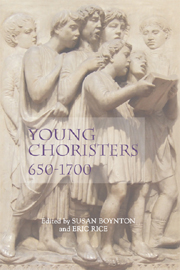Book contents
- Frontmatter
- Contents
- List of Illustrations
- List of Musical Examples
- Acknowledgements
- Dedication
- Introduction: Performance and Premodern Childhood
- 1 The Boy Singers of the Roman Schola Cantorum
- 2 Boy Singers in Medieval Monasteries and Cathedrals
- 3 The Musical Education of Young Girls in Medieval English Nunneries
- 4 Choirboys in Early English Religious Drama
- 5 From Mozos de coro towards Seises: Boys in the Musical Life of Seville Cathedral in the Fifteenth and Sixteenth Centuries
- 6 The Seeds of Medieval Music: Choirboys and Musical Training in a Late-Medieval Maîtrise
- 7 Choirboys in Cambrai in the Fifteenth Century
- 8 Choirboys and Vicaires at the Maîtrise of Cambrai: A Socio-anthropological Study (1550–1670)
- 9 Choirboys, Memorial Endowments and Education at Aachen's Marienkirche
- 10 Thomas Mulliner: An Apprentice of John Heywood?
- 11 Cantando tutte insieme: Training Girl Singers in Early Modern Sienese Convents
- 12 Choirboys in Early Modern Rome
- General Bibliography
- Index
4 - Choirboys in Early English Religious Drama
Published online by Cambridge University Press: 12 September 2012
- Frontmatter
- Contents
- List of Illustrations
- List of Musical Examples
- Acknowledgements
- Dedication
- Introduction: Performance and Premodern Childhood
- 1 The Boy Singers of the Roman Schola Cantorum
- 2 Boy Singers in Medieval Monasteries and Cathedrals
- 3 The Musical Education of Young Girls in Medieval English Nunneries
- 4 Choirboys in Early English Religious Drama
- 5 From Mozos de coro towards Seises: Boys in the Musical Life of Seville Cathedral in the Fifteenth and Sixteenth Centuries
- 6 The Seeds of Medieval Music: Choirboys and Musical Training in a Late-Medieval Maîtrise
- 7 Choirboys in Cambrai in the Fifteenth Century
- 8 Choirboys and Vicaires at the Maîtrise of Cambrai: A Socio-anthropological Study (1550–1670)
- 9 Choirboys, Memorial Endowments and Education at Aachen's Marienkirche
- 10 Thomas Mulliner: An Apprentice of John Heywood?
- 11 Cantando tutte insieme: Training Girl Singers in Early Modern Sienese Convents
- 12 Choirboys in Early Modern Rome
- General Bibliography
- Index
Summary
INTRODUCTION
THIS essay examines the role of choirboys in vernacular religious drama in England around 1400–1600. Setting aside the choirboy companies of the late sixteenth and early seventeenth centuries and the boys employed in the adult professional theatres, the residual repertory is that of the civic and parish dramas. The evidence is scanty and difficult to interpret, especially in the still-emerging area of parish drama; but the financial accounts concerning drama in the larger towns and cities provide some information from which a broad picture can be developed.
The plays concerned are the anonymous biblical, saint, and morality plays, which used or may have used choirboys in two main ways. First, because community and commercial drama in England used only male actors (unlike France, for instance, where females are well documented), female roles were played by males. The great majority of these roles, which presented young females, were taken by young male actors with treble voices: only such roles as the prophetess Anna (in the Presentation plays) and the Blessed Virgin at the end of her life (plays of the death of Mary) are known to have been taken by older actors. The young male actors might be apprentices or journeymen of the trade guilds concerned or choirboys from a local church, although some may have belonged to neither of these categories.
Second, many plays required solo singers or small groups of singers to perform items of plainsong or, more rarely, polyphony. While some items were obviously intended to be sung by members of the cast who were not professional singers, most demanded professionals. This is clear from both the repertory (liturgical chant normally performed by trained singers, or polyphony, which demanded a high level of specialist training) and the quality of performance demanded by the dramatic situation (such as the music of angels). Often it is impossible to tell who the professional singers were, but sometimes they can be identified as local church singing-men, and sometimes as choirboys. To some extent this second use of boys overlaps with the first, as a professional singer was sometimes needed to play a female role (such as that of the Virgin Mary) that demanded high-quality singing. Liturgical items were sometimes sung by other characters, including angels, which also might demand a professional singer.
- Type
- Chapter
- Information
- Young Choristers, 650–1700 , pp. 68 - 85Publisher: Boydell & BrewerPrint publication year: 2008



